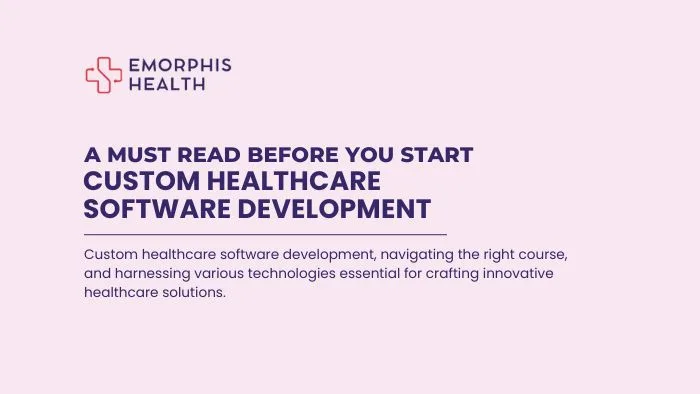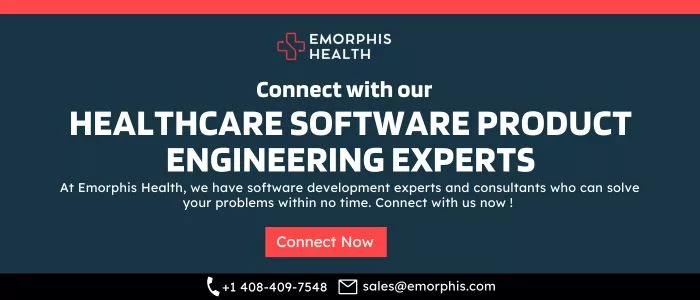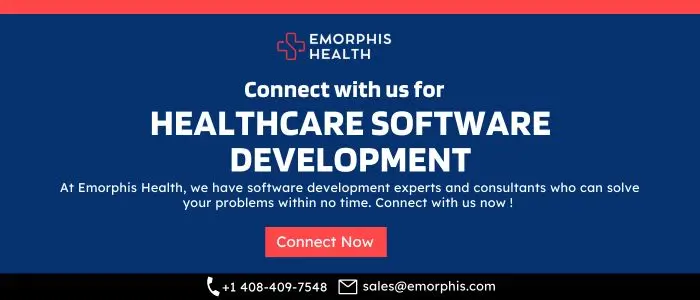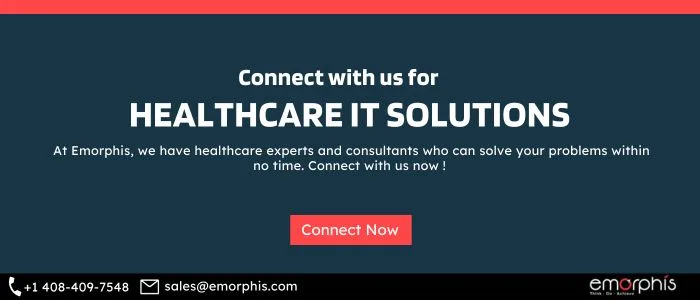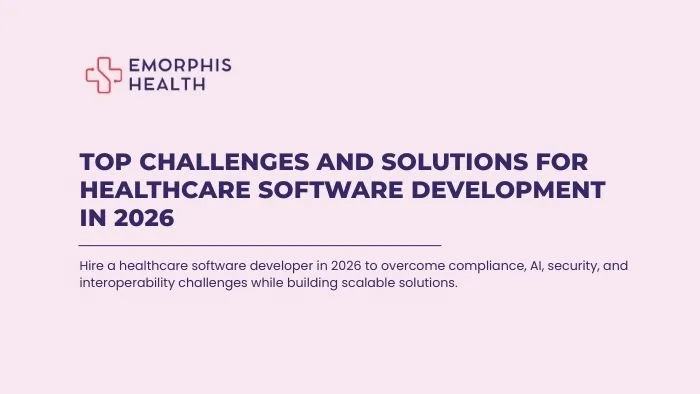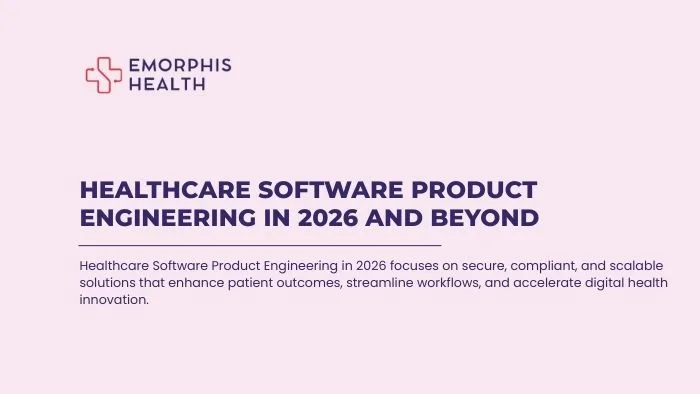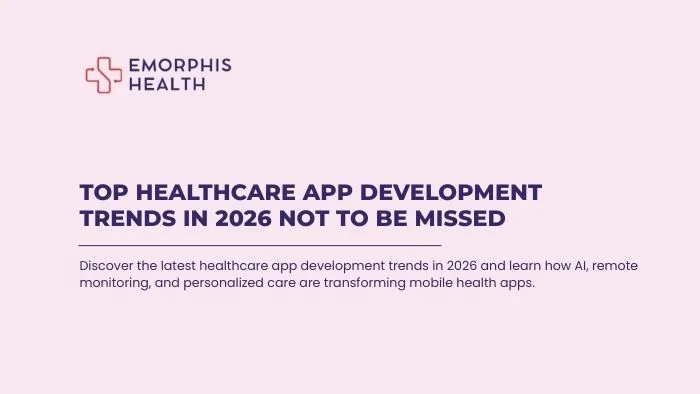What will you learn from this article?
See Contents
- 1 What will you learn from this article?
- 2 Overview
- 3 Types of Software Development
- 4 Choosing the Right Path for Custom Healthcare Software Development
- 5 Technologies in Healthcare Software Development
- 6 Software Development Process
- 7 Additional Points in the Custom Healthcare Software Development Process
- 8 Specialized Terrain of Healthcare Software Development
- 9 Cost and Timeframe in Healthcare Software Development
- 10 Key areas of focus while estimating the cost and time of custom healthcare software development
- 11 Conclusion
- Healthcare IT solutions market details indicate significant growth opportunities.
- Specialized expertise required in healthcare software development, including healthcare domain experts and software developers.
- Utilization of diverse technologies like web development, mobile development, and blockchain in healthcare software development.
- Regulatory compliance is essential in healthcare software to ensure patient privacy and security.
- Cost and timeframe considerations in custom healthcare software development compared to traditional software projects.
Overview
In software development, where innovation and technology intertwine, a niche demands precision, expertise, and a deep understanding of healthcare nuances.
According to the Mordor Intelligence report, the healthcare IT solutions market is poised for significant growth, with projections indicating that by 2029, it will soar to an estimated value of US$ 728.63 billion. This expansion reflects a robust compound annual growth rate (CAGR) of 15.24% from 2024 to 2029. These forecasts underscore the increasing demand for innovative healthcare technologies and digital solutions to address the evolving needs of healthcare providers, improve patient outcomes, and enhance operational efficiency across the healthcare ecosystem.
As advancements in technology continue to revolutionize the healthcare industry, this upward trajectory highlights the pivotal role that healthcare IT solutions will play in shaping the future of healthcare delivery and management.
Custom Healthcare software development stands apart from its traditional counterparts, not only in its objectives but also in its methodologies, technologies, and challenges.
Before delving into the intricacies of custom healthcare software development, it’s crucial to grasp the broader landscape of software development itself.
Types of Software Development
Software development encompasses various types, each tailored to meet specific needs and industries. These types include:
- Web Development: Focuses on creating websites or web applications accessible via browsers.
- Mobile Development: Centers around crafting applications for mobile devices like smartphones and tablets.
- Embedded Systems Development: Concentrates on programming embedded systems, such as those found in medical devices, automotive systems, or IoT devices.
- Enterprise Software Development: Deals with creating software solutions for businesses, including ERP systems, CRM software, and more.
While all these types have their merits and applications, custom healthcare software development requires a distinct approach due to the sensitive nature of the domain. Healthcare software development spans a wide range of applications, including Electronic Health Records (EHR) systems, telemedicine platforms, medical imaging software, and more.
Choosing the Right Path for Custom Healthcare Software Development
When embarking on a custom healthcare software development journey, it’s crucial to assemble a team with specialized expertise. A typical custom healthcare software development team may comprise:
- Healthcare Domain Experts: Professionals with a deep understanding of healthcare regulations, standards, and workflows.
- Software Developers: Skilled programmers adept in languages such as Java, Python, or C#, capable of translating healthcare requirements into functional software solutions.
- User Experience (UX) Designers: Experts in crafting intuitive interfaces tailored to the needs of healthcare professionals and patients alike.
- Quality Assurance (QA) Engineers: Responsible for ensuring the reliability, security, and compliance of the software through rigorous testing.
- Data Analysts and Scientists: Individuals proficient in handling and analyzing healthcare data, essential for solutions like predictive analytics and population health management.
In terms of technologies, custom healthcare software development often leverages a mix of established and emerging tools and frameworks.
Technologies in Healthcare Software Development
In custom healthcare software development, a diverse array of technologies plays pivotal roles in shaping the landscape of digital healthcare solutions. These technologies encompass various facets, each contributing to the seamless delivery of healthcare services and the optimization of clinical workflows.
a. Web Development Technologies
Web development technologies form the backbone of many healthcare software solutions, offering robust platforms for creating accessible and scalable web-based applications. Frameworks like React.js, Angular, and Vue.js provide developers with powerful tools for building intuitive and interactive user interfaces. Additionally, backend development technologies such as Node.js, Django, and .NET Core facilitate the development of robust server-side logic, enabling secure data storage, retrieval, and processing in healthcare web applications.
b. Mobile Development Technologies
Mobile applications have become integral components of modern healthcare delivery, offering convenient access to healthcare services and resources on smartphones and tablets. Technologies like Swift for iOS and Kotlin for Android empower developers to create native mobile applications with seamless performance and user experience. Alternatively, cross-platform frameworks like React Native and Flutter enable the development of mobile apps that can run on multiple platforms, streamlining the development process and reaching a broader audience.
c. Database Technologies
Databases serve as the foundation for storing and managing vast amounts of healthcare data, ranging from patient records and medical images to clinical notes and administrative information. Relational database management systems (RDBMS) like MySQL, PostgreSQL, and Microsoft SQL Server are commonly used in healthcare settings for their robustness, scalability, and data integrity features. Additionally, NoSQL databases such as MongoDB and Cassandra offer flexible data models and horizontal scalability, making them suitable for handling complex and unstructured healthcare data.
d. API Technologies
APIs (Application Programming Interfaces) play a crucial role in facilitating seamless communication and integration between different healthcare systems and applications. RESTful APIs (Representational State Transfer) are widely adopted in custom healthcare software development for their simplicity, scalability, and compatibility with web-based architectures. Technologies like Swagger/OpenAPI Specification provide tools for designing, documenting, and testing APIs, ensuring interoperability and consistency across healthcare systems. Healthcare APIs and Microservices are vital for facilitating data exchange, interoperability, and integration among different healthcare systems.
e. Interoperability Technologies
Interoperability is essential for enabling the exchange and sharing of healthcare data across disparate systems and organizations, promoting coordinated care and informed decision-making. Standards like HL7 (Health Level Seven) and FHIR (Fast Healthcare Interoperability Resources) define protocols and data formats for exchanging healthcare information and facilitating interoperability between electronic health records (EHR) systems, medical devices, and other healthcare applications. Additionally, technologies like DICOM (Digital Imaging and Communications in Medicine) enable the standardized exchange of medical images and diagnostic reports, ensuring seamless integration with imaging systems and Picture Archiving and Communication Systems (PACS).
f. Health Information Exchange (HIE) Platforms
HIE platforms play a crucial role in facilitating the secure exchange of patient information among healthcare providers and organizations, improving care coordination and patient outcomes. These platforms utilize technologies like HL7 and FHIR to standardize data exchange protocols and ensure interoperability between disparate healthcare systems. By enabling seamless communication and data sharing, Health Information Exchange platforms enhance collaboration among care teams and support informed decision-making at the point of care.
g. Internet of Things (IoT)
IoT technologies are revolutionizing healthcare by enabling the connectivity and data exchange between medical devices, wearables, and other IoT-enabled devices. IoT devices such as remote patient monitoring sensors, smart insulin pumps, and wearable fitness trackers collect real-time health data, allowing healthcare providers to monitor patients remotely, personalize treatment plans, and intervene proactively. By leveraging IoT technologies, healthcare organizations can enhance patient engagement, improve care quality, and optimize resource utilization across the care continuum.
h. Blockchain
Blockchain technology holds promise for enhancing data security and integrity in healthcare by providing immutable and auditable records of patient information and transactions. Blockchain-based solutions offer decentralized and tamper-proof storage of healthcare data, protecting sensitive information from unauthorized access, tampering, or data breaches. Moreover, blockchain enables secure and transparent management of healthcare transactions, such as patient consent management, medical billing, and supply chain traceability, fostering trust and accountability in healthcare ecosystems.
Overall, the convergence of diverse technologies in custom healthcare software development enables the creation of innovative solutions that revolutionize patient care, clinical workflows, and healthcare delivery. By leveraging the power of web, mobile, database, API, interoperability, HIE, IoT, blockchain, and other cutting-edge technologies, developers can drive positive outcomes in healthcare, empowering providers, engaging patients, and advancing the future of digital health.
As we explore custom healthcare software development, we see lots of cool tech like apps, databases, and more. But it’s not just about the tech; it’s also about the steps we take to make software. Therefore, understanding the traditional software development process and its adaptations within the healthcare domain becomes imperative as we navigate the complexities of custom healthcare software development.
Let’s see how this roadmap works in healthcare software, where things are a bit different.
Software Development Process
In traditional software development, projects typically follow established methodologies such as the waterfall or Agile approach. The waterfall model involves a sequential process, where each phase (requirements gathering, design, implementation, testing, deployment) is completed before moving on to the next. On the other hand, Agile methodologies emphasize flexibility and collaboration, with iterative cycles of development and frequent feedback from stakeholders guiding the process.
Regardless of the specific methodology employed, traditional software development generally begins with gathering requirements from stakeholders to understand the desired functionality and features of the software. This phase is crucial for defining the scope of the project and setting clear objectives for the development team.
Once the requirements are established, the design phase begins, where architects and designers create blueprints and mockups of the software’s user interface and underlying architecture. This phase lays the foundation for the development work that follows and ensures alignment between the technical implementation and the desired user experience.
After the design is finalized, developers start coding the software according to the specifications outlined in the requirements and design documents. This phase involves writing, testing, and debugging code to create functional software components that fulfill the project’s objectives.
Once the initial development work is complete, the software undergoes rigorous testing to identify and fix any defects or issues. Quality assurance engineers conduct various types of testing, including unit testing, integration testing, and system testing, to ensure that the software meets quality standards and functions as intended.
Finally, after thorough testing and validation, the software is deployed to production environments and made available to end users. This phase involves activities such as installation, configuration, and training to ensure a smooth transition from development to production use.
Additional Points in the Custom Healthcare Software Development Process
While the traditional software development process provides a solid foundation for building software applications in various domains, custom healthcare software development introduces additional complexities and considerations that require specialized expertise and approaches.
1. Regulatory Compliance
Healthcare software must adhere to stringent regulations and standards, such as HIPAA (Health Insurance Portability and Accountability Act) in the United States or GDPR (General Data Protection Regulation) in Europe. Developers and stakeholders must ensure that the software complies with these regulations to protect patient privacy and security.
2. Interoperability
Healthcare systems often need to communicate and exchange data with each other to facilitate seamless care coordination and information sharing. Interoperability standards like HL7 (Health Level Seven) and FHIR (Fast Healthcare Interoperability Resources) play a crucial role in enabling interoperability between different healthcare systems and applications.
3. Usability and Accessibility
Healthcare software must be user-friendly and accessible to a diverse user base, including clinicians, patients, and administrative staff. User-centric design principles and accessibility standards guide the development process to ensure that the software meets the needs of all users, regardless of their abilities or technical expertise.
4. Clinical Decision Support
Healthcare software often incorporates clinical decision support systems (CDSS) to assist healthcare providers in making informed decisions. These systems leverage algorithms, machine learning, and evidence-based guidelines to offer diagnostic suggestions, treatment recommendations, and alerts for potential adverse events.
5. Data Security and Privacy
Protecting sensitive patient data is paramount in custom healthcare software development. Encryption, access controls, and audit trails are employed to safeguard patient information from unauthorized access or breaches. Data security is the most important part, with regular security assessments and updates to mitigate emerging threats.
Incorporating these additional points into the software development process ensures that healthcare software meets the unique requirements and challenges of the healthcare domain, ultimately leading to improved patient care and outcomes.
Specialized Terrain of Healthcare Software Development
Healthcare software development stands apart from traditional software development in several critical aspects, primarily due to the specialized nature of the healthcare industry and the unique challenges it presents.
Unlike traditional software, healthcare software must adhere to stringent regulatory requirements such as HIPAA compliance (Health Insurance Portability and Accountability Act) in the United States or GDPR (General Data Protection Regulation) in Europe, which govern the handling of sensitive patient data.
For example, electronic health record (EHR) systems like Epic or Cerner are designed to comply with HIPAA compliance, ensuring that patient information is securely stored and accessed only by authorized personnel.
Additionally, interoperability is a key consideration in custom healthcare software development, as healthcare systems often need to communicate and exchange data with each other to facilitate seamless care coordination. Standards like HL7 (Health Level Seven) and FHIR (Fast Healthcare Interoperability Resources) play a crucial role in enabling interoperability between different healthcare systems and applications.
Moreover, usability and accessibility are paramount in healthcare software, as these systems must be accessible to a diverse user base including clinicians, patients, and administrative staff. User-centric design principles guide the development process, ensuring that software interfaces are intuitive, inclusive, and easy to navigate.
For example, telemedicine platforms like Teladoc or Doctor on Demand provide user-friendly interfaces that enable patients to easily schedule virtual appointments and communicate with healthcare providers from the comfort of their homes.
Hence, we can state that custom healthcare software development requires a specialized approach that considers regulatory compliance, interoperability, usability, and accessibility to meet the unique needs of the healthcare industry and improve patient care outcomes.
Cost and Timeframe in Healthcare Software Development
The cost of developing healthcare software and apps can vary widely depending on factors such as complexity, features, regulatory requirements, and technology stack. However, on average, healthcare software and app development projects can range from tens of thousands to millions of dollars.
i. Healthcare Apps
Basic healthcare apps with limited features, such as appointment scheduling or medication tracking, may cost anywhere from US$ 20,000 to US$ 100,000 to develop. These apps typically have straightforward user interfaces and minimal integration requirements.
ii. Mid-Range Healthcare Software Solutions
More comprehensive healthcare software solutions, such as electronic health record (EHR) systems or telemedicine platforms, may cost between US$ 100,000 to US$ 500,000 to develop. These solutions often require custom features, interoperability with other systems, and compliance with healthcare regulations.
iii. Enterprise-Level Healthcare Software
Large-scale healthcare software projects, such as hospital management systems or population health management platforms, can cost upwards of US$ 1 million or more. These projects involve complex integrations, advanced features, and extensive customization to meet the specific needs of healthcare organizations.
It’s important to note that these cost estimates are approximate and can vary significantly based on project requirements and development approach. Also, ongoing maintenance, updates, and support costs should be considered part of the investment in custom healthcare software development. Developing healthcare software incurs different costs and timeframes compared to traditional software projects due to the specialized requirements of the healthcare domain.
Key areas of focus while estimating the cost and time of custom healthcare software development
- Regulatory Compliance: Ensuring compliance with healthcare regulations like HIPAA or GDPR requires additional expenses for data security measures and compliance audits, which can prolong development timelines.
- Specialized Expertise: Hiring healthcare domain experts and compliance officers adds to labor costs and may extend project durations due to the need for specialized knowledge.
- Quality Assurance: Rigorous testing for reliability, security, and compliance entails additional investments in testing processes and tools, potentially lengthening development timeframes.
- Data Security Measures: Implementing robust security measures, such as encryption and access controls, requires extra resources and may impact project schedules.
- Interoperability Solutions: Integrating with existing systems and ensuring interoperability between platforms adds complexity and can extend development timelines.
- User Training and Support: Providing user training and ongoing support requires additional resources and may affect project durations.
- Compliance Audits and Certifications: Obtaining and maintaining regulatory certifications may involve additional costs and time commitments for compliance audits and certifications.
Overall, the specialized requirements and regulations of custom healthcare software development contribute to increased costs and longer timeframes compared to traditional software projects. These investments are essential for ensuring the quality, security, and compliance of healthcare software solutions.
Conclusion
In conclusion, the journey of healthcare software development involves selecting the right path and leveraging a range of technologies to create innovative solutions. With a meticulous approach to the software development process, including considerations for regulatory compliance, interoperability, and specialized expertise, organizations can navigate the specialized terrain of custom healthcare software development.
When estimating costs and timelines, key areas to focus on include regulatory compliance expenses, specialized expertise fees, quality assurance investments, data security measures, interoperability solutions, and user training. By prioritizing these factors, healthcare organizations can drive positive outcomes, improve patient care, and shape the future of healthcare delivery.
Emorphis Health stands out as a valuable partner in this journey, offering specialized solutions tailored to the unique needs of the healthcare industry. By leveraging Emorphis Health’s expertise, organizations can confidently embark on their software development journey, knowing they have a partner dedicated to delivering solutions that drive efficiency, improve patient outcomes, and transform healthcare delivery.

